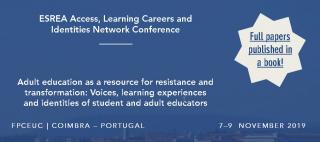Adult education as a resource for resistance and transformation: Voices, learning experiences and identities of student and adult educators.
Conference website: https://esreafpceuc2019.wixsite.com/esrea2019
At the 2013 conference of this network in Linköping, Sweden the theme was ‘Times of Change: The role of adult education in times of crisis’. In recent years the focus on the ‘crisis’ and the role of adult education has rightly been a concern which has been expressed in publications and at other conferences. The last ESREA Access, Learning Careers and Identity Network Conference held in 2017 in Rennes, France moved to a different theme and interrogated the concept of learning contexts and identity. In Coimbra we want to build on the Rennes conference but also go back to aspects of the Linköping conference. We want to explore the ‘possibility of hope’ within adult education as advocated by Raymond Williams (1989) while also recognising the impact that the crisis has had, and still has, on individual lives, families, communities and society. Times have also changed in different ways since the network conference in 2013 and new ‘crises’ have emerged. We are seeing new political and social changes as a result of the rise of neoliberalism, the far right and popularism in Europe and beyond, posing a threat to democracy and equality in society as communities and societies become divided. In neo-liberal times adult education, in all sectors, has become marketised, individualised and competitive. Adult education, and education more broadly, is increasingly being viewed in economic terms and its contribution to economic development rather than as a social and public good.
As adult educators we need to reflect on how adult education, in all its contexts, offers and potentially builds a space for resistance and change in the lives of adult students. In other words, how can adult education empower adult learners and change identities and lives through different educational contexts in a way which helps to facilitate a more democratic society? How can adult educators and adult education challenge and shift the current tide towards neo-liberalism, marketisation and the focus on human capital back to a humanistic education for social purpose, social justice and social change? At the same time we need to understand what impact neoliberalism and marketisation are having on the learning experiences of adults as well as the implications of this for adult educators and institutions.
This conference will explore and debate different possibilities for promoting the hope vested in education to empower adult learners, restore democracy, build a more just society and improve lives. In relation to access to adult education this raises issues of who gets access to what? Are certain individuals and groups left out? Or are there good examples of practice and research in relation to this? We want to focus on adult education in its broadest sense and a range of contexts such as community education, further and higher education and workplace learning (informal, non-formal and formal contexts). We want to explore these different educational and learning contexts and resources and their potential for developing learning careers and identities in ways which can lead to critical thinking, self-development and transformation both individually and collectively (Lima, 2018). In working towards more democratic and egalitarian adult education practices agency becomes important in challenging structural inequalities. Issues of class, gender, race and disability inequalities and their intersections become important in this process.
And finally is the new idea of sharing and the ‘act of sharing’ a potential resource? ‘Shared education’ is an approach used in school education in divided communities and countries such as Northern Ireland to foster partnership and collaboration between people and resources with the aim of enhancing community relations (Loader & Hughes, 2017:7). What is the potential of this for adult education?
REFERENCES
Lima, L (2018) Adult and permanent education in times of crisis: A critical perspective based on Freire and Gelpi, Studies in the Education of Adults, 50(2), pp. 219-238.
Loader, R & Hughes, J (2017). Balancing Cultural Diversity and Social Cohesion in Education: The Potential of Shared Education in Divided Countries, British Journal of Educational Studies, 65(7), pp. 3-25.
Williams, R (1989) . Resources of Hope. London: Verso.
Running sneakers | adidas Yeezy Foam Runner Mineral Blue - Grailify
- Log in to post comments














Latest Comments